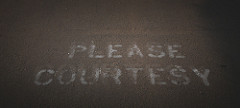Professional Courtesy Between Community Professionals

Credit: Tony Webster (CC BY 2.0)
Recently, I witnessed what I regarded as disgraceful behavior by a community professional, directed at another community professional, on the community that the second person was responsible for. It really got me thinking about professional courtesy within our industry.
When you do this work and you encounter someone else doing the work, in their community, how should you interact with them? The golden rule – treating people as you would like to be treated – is a good start, but it’s not specific enough.
I regularly see community professionals who enter spaces, that have clearly posted guidelines, and then violate those guidelines. What I am about the write may sound harsh, but I’m tired of it. We have to be better than this.
Understanding the Community You Are Entering
First, I believe that you have a duty to seek out the guidelines for any community you want to engage in. Yes, amongst our fellow pros, we may joke that people never read the policies that we write. But if you don’t make an effort to read them yourself, that’s embarrassing. No excuses here, no critiques of someone else’s policies. “It’s too long” is a major cop-out.
Recognize that how you manage a community could be very different from how someone else manages theirs. Your way may be right for you, but it is not “right” in an absolute sense. Yes, there are ethical and legal issues, but community guidelines mostly deal with behavioral issues and societal norms.
When You’ve Violated the Guidelines
If a community moderator or manager tells you that you have violated the guidelines, your default response should be: “I’m sorry. I’ll keep that in mind for the future.” That’s it. Ask questions if you are genuinely and legitimately confused (and not just lazy).
Think long and hard before deciding to get defensive or challenge the guidelines or the moderator’s interpretation of them. Example: if someone tells you that your post is self-promotion, it probably was. Your definition of self-promotion means absolutely nothing. All that matters is the definition that the moderation is applying.
Saying something like, “you should be able to tell the difference between self-promotion and valuable content” is condescending and disrespectful. For my entire career, I have heard some form or another of “that wasn’t spam, it was relevant content.” Any community professional who says this is not a competent professional.
Do You Know Your Community? Well, They Know Theirs
Accepting that your fellow professional is correct in the application of the guidelines for the community they manage is a crucial part of professional courtesy. Put simply: they know their community better than you do. For you to suggest otherwise, comes across as arrogant.
For instance, in the example that prompted this post, instead of respecting the community professional’s decision regarding the violation, the person suggested that they ask the community, as a whole, if they felt it was a violation.
Yeah, that’s exactly what creates great community management. Being micromanaged about every tiny moderation decision you make. Why don’t we just put every piece of spam up for a vote? It’s ridiculous.
Your Experience Is Great, but Don’t Force It on People
Check yourself and your experience. You probably haven’t been managing communities as long as I have. If you remove my post, I’m not going to throw it in your face. Guess what? Nobody really cares. If I’m willing to ban my #1 poster and a “world champion kickboxer,” I’m totally going to apply the guidelines to you.
There is no special treatment for you. You shouldn’t expect any. If you expect a fellow community manager to make an exception for you just because you have the same job, you are the problem.
When a community professional enters my space, I would like to believe they will make my job no more difficult than it already is. That should be your goal.
But I Can Help!
All of this is not to say that you can’t offer feedback, but I would ensure that the feedback comes from a good place. It isn’t the result of you being cited for a violation or in response to the associated message. It isn’t made as part of a big public show. You don’t throw your experience around. It’s a simple thought, respectfully shared, with no expectation. Otherwise, keep it to yourself.
There are several traits that separate a mediocre community professional from a good one. Amongst them is a strong sense of self-awareness, of your place, of how you are perceived. A lack of self-awareness contributes to a belief that you are above the community you have just entered, and know better than the professional who actually manages it.
